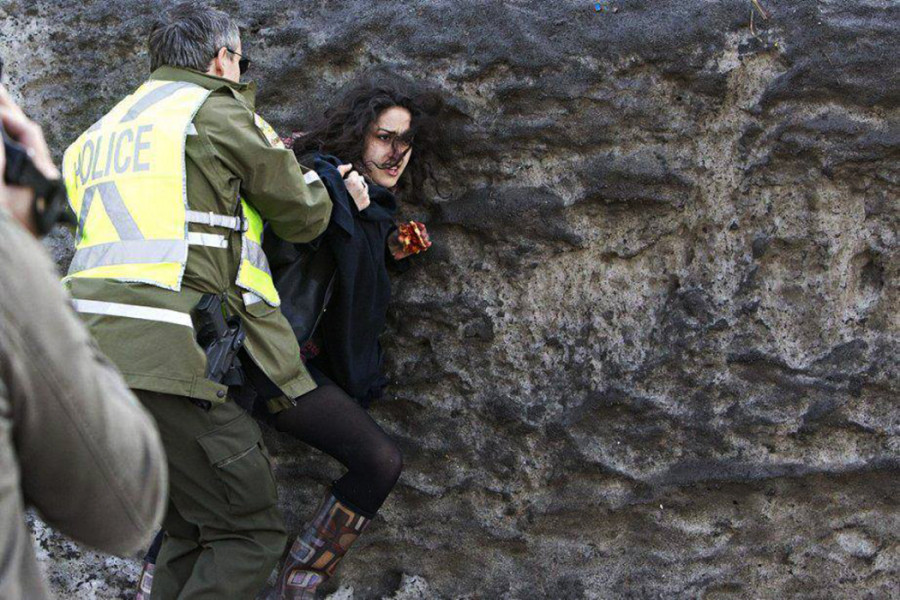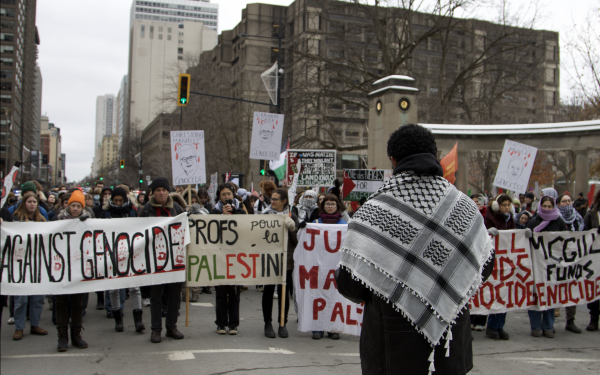Student Protester Looks Back to Maple Spring
Yalda Machouf-Khadir Details Her Controversial Experiences in the 2012 Student Movement
It’s April 13, 2012 at approximately 8:30 a.m.
Students arrive at the office of Line Beauchamp, the Minister of Education, in northern Montreal. With a crowbar, they break in and occupy the small office, while another group of protesters prepare to raid Université de Montréal. Both incidents happen within a 24-hour period.
When the police arrived at Beauchamp’s office, the glass facade was shattered and only one individual was still on the scene. Journalist Philippe Teisceira-Lessard was arrested, then released shortly after. A day later, in an article published in La Presse, he described the scene as a “battleground.”
“There’s DNA everywhere,” said a policewoman—according to Teisceira-Lessard—as she walked through the rubble.
In the university building, the students left paint-covered walls—in the government office, they left fingerprints.
On March 19, 2012, when asked if she would give way to the students’ pressure to stop tuition hikes, Beauchamp’s answer was short and forthright. “No, the decision has been taken,” she said.
On May 14, a month after the incidents, Beauchamp resigned, as she said she wasn’t able to help solve the unrest with student protesters.
A First Hand Account
Yalda Machouf-Khadir, daughter of Quebec Solidaire co-leader Amir Khadir, was involved in these controversial incidents.
According to her, the two events polarized public opinion about what would later be known as the 2012 Maple Spring.
Machouf-Khadir was arrested for her actions at both Université de Montréal and the former minister’s office. She spent five days in detention and was released after posting $2,000 bail.
She was also implicated in the occupation and vandalization of the Cégep du Vieux Montréal that same year.
On Feb. 16, 2015, a little more than a year ago, Machouf-Khadir was conditionally discharged, meaning she would not have any criminal record after three years of probation and 240 hours of community service in a 18-month period, and on the basis that she maintain proper conduct, according to the court documents.
She has dealt with the Quebec justice system more than once, and she has been scrutinized by the media, but she manages to keep a positive attitude. Machouf-Khadir now wants to be a lawyer in order to help those who go through similar experiences.
At a busy coffee shop in downtown Montreal, the UQAM law student was shown a timeline of the events that led to her various accusations, the trials and the releases during the 2012 “Printemps érable,” and the months following. She hadn’t seen the chronological order of events in some time—it seemed to refresh her memory.
1_900_598_90.jpg)
In 2012, from February to September, students across Quebec were protesting the provincial government’s decision to raise university tuition. Numerous CEGEP and university student associations from across the province were on strike.
“They learned of my involvement in [the April events] pretty early,” Machouf-Khadir said. She gave her fingerprints to the police on May 22, 2012, a little more than a month after the third incident. Her fingerprint would later be found in Beauchamp’s office.
From May 22 to June 7, Machouf-Khadir says she was surveilled by the police. During that time, the police collected evidence by following her movements during protests. She believes the police were trying to build links between militants at the time. Her boyfriend and other individuals—who she wouldn’t identify—were also watched.
This period saw an increase of protests. On May 17, five days before the start of the surveillance, Jean Charest—Quebec’s Premier at the time—signed the highly controversial Bill 78.
The new bill deemed illegal any protests of more than 50 individuals if the march’s itinerary wasn’t given to the police eight hours beforehand. Léo Bureau-Blouin, then-President of the Fédération étudiante collégiale du Québec, said that the laws mimicked those of a “police state.”
On June 7, the police made a series of arrests and house searches. A handcuffed Machouf-Khadir was filmed by a La Presse reporter, going down the stairs of her parents’ Plateau Mont-Royal apartment. A large cardboard hung outside the front door with a quote by Thomas Jefferson painted on it: “When injustice becomes law, resistance becomes duty.”
The student spent the next five days in prison—days she described as “trying” and emotionally “destabilizing.” The first two were spent at the SPVM’s South Operational Centre. The next three were spent at the Tanguay prison for women in Ahuntsic.
“I was able to see the power relationship between detainees, and between detainees and correctional officers,” she said. “It was tough to lose my bearings and to come face-to-face with this reality.”
The UQAM student had numerous conditions when she was released, such as a curfew from 11 p.m. to 7 a.m. everyday—a time period when she needed to be at her parents’ home. She was not allowed to talk to anyone with a criminal record or to any of the co-defendants.
The goal of these conditions, in her mind, was to isolate militants and break up the movement.
“It served their interests to work that way because they were scaring off people,” she said.
The proceedings for the three cases began in 2014. Like many students who were arrested during that time, Machouf-Khadir’s first lawyer was Denis Poitras. Students would write down Poitras’ number on their arms during the protests, she explained, laughing.
Machouf-Khadir admired Poitras’ work. It was a deciding factor motivating her to study law.
“I understood the importance of having a trusting relationship with the person that defends you.” She was able to be honest when explaining the facts because she knew both her and her lawyers looked at the conflict through the same lens.
Poitras took most of the cases pro bono. He went bankrupt in August 2013 and lost his license, leaving behind more than 1,700 court files.
Machouf-Khadir’s last lawyer was Pierre Poupart, lawyer of convicted killer Guy Turcotte. The law student states that she was already in the process of changing lawyers when Poitras went bankrupt.
Connecting the Dots
On a day-to-day basis, her first probation doesn’t weigh on her, but she does feel more vulnerable whenever she is in a protest. She feels that the situation could turn against her even if she acts within her imposed conditions.
Her release from probation is bittersweet.
“It’s frustrating because [the discharge] of many students is due to privileges such as our social status, our social network, our education, our [race and ethnicity] and our political and economic capital,” she commented.
Machouf-Khadir is nostalgic of the Maple Spring. She’s proud of the students who mobilized and their ability to initiate a debate within the greater population.
Just as she was often personified as the radicalist, Gabriel Nadeau-Dubois, a spokesperson for a militant group of the time, was her opposite. The member of Coalition large de l’Association pour une solidarité syndicale étudiante was often seen as the key figure of the movement.
“When [Nadeau-Dubois] left, even though he said ‘I’m leaving it to others because I’ve done my share and I can’t do it anymore’ people thought that the strike was over,” Khadir remembered.
In a sense, Nadeau-Dubois and Machouf-Khadir were involved in the same battle: one for collective unity rather than personal celebrity.
While handling her case and by talking to others in the same situation, Machouf-Khadir realizes that there are few resources, especially lawyers, dedicated to the cause.
“We are going to need more and more lawyers like that […] so that they have successors,” she said. “Repression will only increase and it’ll be more frequent and more fierce.”





__600_375_90_s_c1.jpg)
_600_375_90_s_c1.jpg)
2__600_375_90_s_c1.jpg)